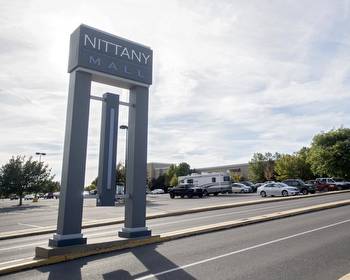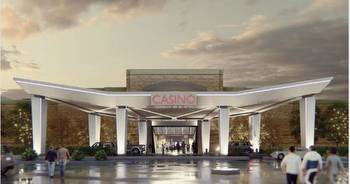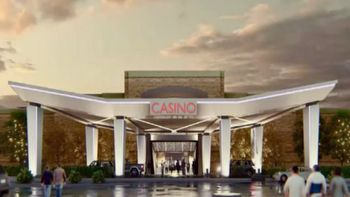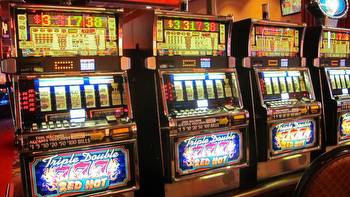College Township Council Mulls Next Step in Response to Casino Opposition
Preliminary design rendering of the exterior of the proposed mini-casino at the Nittany Mall. Image by Nelson Worldwide
Opponents of the proposed mini-casino at the Nittany Mall have sent a seemingly endless stream of letters for nearly a year to the Pennsylvania Gaming Control Board and College Township seeking to put stop to the plan as it inches closer to a licensing decision. On Thursday, College Township council spent about two and a half hours discussing the casino and next steps in response to that opposition.
Assistant Township Manager Mike Bloom said correspondence received by the township — including more than 200 new letters mostly citing negative impacts of gambling and the casino that were included in Thursday’s agenda — has had two consistent questions: can the township opt out as a host municipality for a casino, and can council rescind its approval of a land development plan for the proposed venue at the former Macy’s department store site?
In both cases the answer is no, township solicitor Louis Glantz wrote in an opinion.
The township’s right to opt out expired in late August 2019, 60 days after Act 63 of 2019 was signed into law to codify those municipalities that asked to be excluded from hosting gaming establishments.
Council also can’t arbitrarily deny a land development plan that meets township ordinances, nor can it rescind the conditional approval given to the casino development plan last September for exterior improvements to the property. The plan has yet to be recorded because of “a delay caused by government, not the applicant,” Glantz wrote.
“Further, the applicant has acted in reliance of the township’s approval, spending a considerable amount of money, which further solidifies the applicant’s position,” Glantz added.
In letters and among the dozen people who spoke during public comment on Thursday (with many more in attendance), some casino opponents have asked council to write a letter to the Gaming Control Board acknowledging the opposition and requesting that the license be denied.
Council members did not commit to writing the letter, but asked staff to explore the potential ramifications if they were to do so.
“Hypothetically, if such a letter were to be written would there be any legal or financial ramifications for the township in doing so?” Council member Paul Takac said. “I think that’s a very important question to ask.”
“We have a fiduciary responsibility to our township and the residents to make sure that we’re not inviting legal action against ourselves in order to do this,” he later added.
Council also asked staff about the possibility of conducting an independent impact study.
SC Gaming OpCo, the developer of the proposed casino, submitted a third-party report last year as part of the licensing process that found minimal impact on police, fire and EMS services or utility and road infrastructure. The report concluded that the casino would have “a net-positive impact on College Township tourism, helping to revitalize the Nittany Mall and attract other retail and hospitality operators to the area,” but opponents have said that shouldn’t be taken at face value and that the township should conduct its own.
“Can it be done? Absolutely it can be done,” Township Manager Adam Brumbaugh said. “I don’t know that there will be a lot of additional information or value necessarily, only insofar as the impact study that was prepared as part of the licensing requirements interviewed the same individuals locally that we would be going back and interviewing or asking for their analysis of the information at hand.”
“Some cherrypicking” would be needed as far as what items could be included in the study, Brumbaugh said, because the clock is ticking. A Gaming Control Board vote on whether to approve the license could occur as early as November.
Brumbaugh and council members agreed, though, that the study also would be useful if a license is approved.
“Should a license be awarded we’re going to want and need answers to these questions regardless,” Brumbaugh said.
Community members who spoke during public comment cited concerns about crime and impacts of gambling addiction, particularly given the proximity to Penn State and studies that show young adults are most susceptible to the negative impacts of gambling. They also questioned whether the township and Centre County would actually realize the economic benefit projected in the impact report.
It’s unclear whether such arguments would sway the governing board for gambling in Pennsylvania. Since their inception, the only Category 4 casino — referred to as mini-casinos — to be denied a license was in Beaver County, and that was because developers acknowledged they did not acquire the needed funding to move forward.
The twice-denied casino proposed in Gettysburg was also brought up on Thursday. That, however, was a much larger, Category 1 casino planned in close proximity to Gettysburg National Military Park, a proposal that drew national attention and opposition because it was out of character with the hallowed Civil War battleground and the expectation it would lead to even more large-scale development around the historical site.
What’s Happenedand What’s Next
With legislation enacted in the fall of 2017 to add 10 Category 4 casino licenses in Pennsylvania, municipalities were given the opportunity to opt out as host municipalities. College Township was among a few in Centre County that chose not to opt out, in part because a mini-casino could potentially provide a revitalization opportunity for the Nittany Mall.
“The township saw this as a property-specific opportunity for a property-specific challenge,” said council member Eric Bernier, who along with fellow current members Carla Stilson and Rich Francke was also on council in 2017.
A year earlier, the township updated its zoning to allow for gaming in one specific area: a portion of the Nittany Mall property. Because gaming is a legal use in Pennsylvania, municipalities cannot exclude it from zoning entirely, but can limit the area where it is permitted.
Stilson said she isn’t “for the casino” but also does not believe it being located in the Nittany Mall is “the worst-case scenario.”
She noted that College Township is on the outer edge of the Centre Region and that Benner, Potter and Spring townships also did not opt out, meaning a casino easily could have been located “within spitting distance” of College.
“…Of all the places a casino could easily land in our quadrant of Centre County, do I believe that College Township is best-equipped to minimize negative effects? My answer to that is yes,” Stilson said.
Francke echoed Stilson’s position.
“I do believe College Township is best equipped to mitigate the potential negative impacts in this,” Francke said. “By us affording an opportunity, it was using existing infrastructure versus new infrastructure being pushed out.”
Members of the public who spoke at Thursday’s meeting said they would strongly oppose a casino regardless of its location in Centre County.
Council members in 2017 thought the chances of a casino coming to the township were “slim.” But after Macy’s closure in early 2020, investor and Penn State alumnus Ira Lubert had the winning bid of $10 million for a new Category 4 casino at an auction in September of that year. The bid indicated the casino would be located in Centre County, within a 15-mile radius of Unionville.
Bally’s Corporation later announced that it was partnering with Lubert to develop the $123 million mini-casino and subsequent filings identified the 94,000-square-foot anchor spot at the Nittany Mall as the location, pending licensure approval.
The casino would have 750 slot machines, 30 table games and sports betting along with a restaurant and bar, entertainment venue and a multi-outlet quick-serve food and beverage area.
Public comment opened in August 2021 and continued until June 12. At an August 2021 public input hearing, the developers presented an overview of the plans, which were met with nearly unanimous support from those who spoke at the meeting.
In the year since the public hearing, opponents of the casino have been far more vocal in public forums than those who support it.
Bernier noted during that public hearing that township council and staff had traveled to Hempfield Township, where a mini-casino opened in a former Bon-Ton location at the Greensburg Mall. There they spoke to Hempfield officials and mall and casino staff while touring the facility, which Bernier said integrated well into existing infrastructure and showed a mini-casino could be a complementary piece of development in the Dale Summit area of the College Township.
He said on Thursday that council’s research did not raise concerns about a substantial spike in crime associated with the casino.
“All the research we’ve done to date including the trip we made to Greensburg doesn’t really bear a lot of that out,” Bernier said. “Not saying it’s not possible, I’m just saying we’re not seeing a lot of that in the research that we’ve done in comparable situations.”
Bernier and Francke both noted the extensive oversight and regulation of gambling in Pennsylvania.
“Pennsylvania is the most regulated gambling state in the country,” Francke said.
With public comment closed, a Gaming Control Board hearing officer in July scheduled an Aug. 26 deadline for petitions to intervene in opposition to the license and a tentative hearing date on the petitions of Oct. 19.
As expected, Cordish Companies, which operates as Stadium Casino in Pennsylvania, filed a petition to intervene. Cordish filed a still-pending lawsuit in Commonwealth Court in 2021, arguing that Lubert’s bid was improperly awarded and should be set aside.
A separate Gaming Control Board hearing to vote on license approval can only occur after the intervention arguments are settled.
Council, meanwhile, also discusses additions and updates to a timeline of the casino project’s history and frequently asked questions, which will be posted on the township’s website.
“What we’re trying to do is be transparent and offer a window into everything we know about where this has been, where this is going,” Stilson said.
Stilson added that if a casino does materialize, she “fully intend[s] to hold the gaming commission to the fire if we even sense the casino is not correctly enforcing its liquor laws or appropriate management.”
“We really are at attention about this situation and we want to work with the community to bring about the best possible outcome now that Category 4 casinos have come to Centre County,” she said.
StateCollege.com Breaking News
Receive all the latest news and events right to your inbox.























